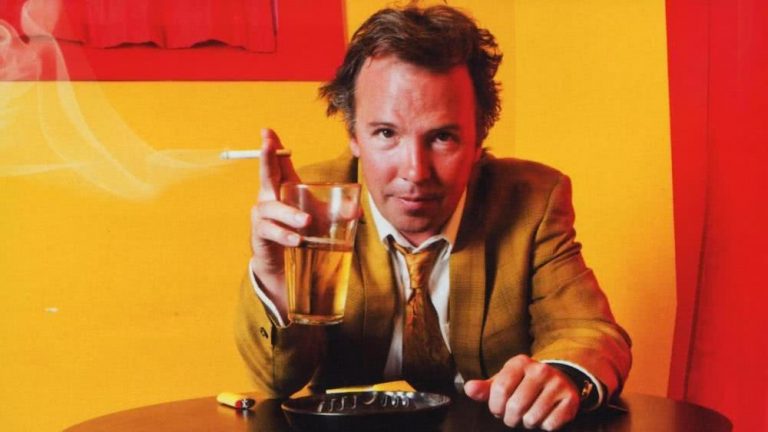On more than one occasion, Doug Stanhope has been compared to Charles Bukowski. The comparison of a very famous and influential poet to a crude stand up comic initially seems discordant. But upon watching Stanhope’s performances, the similarities between the two become apparent: the same inclination for a drink (or seven), the critique of society born from a disenchantment with life, delivered with nothing-to-lose honesty. Stanhope is lauded for his brutally honest, cynical sets, which are often socially and politically charged and highly controversial.
Stanhope describes his foray into comedy as almost accidental: “I just did it. I did well at it, and it was fruitful without really working. I’ve been doing comedy longer than I didn’t do comedy. There’s nothing like stand up once you know what you’re doing. You yell at people for an hour a night, you drink cocktails, go to another tavern and yell at people again.”
Despite his laissez-fair description of his job, and seething cynicism at the world around him, it’s clear that when Stanhope cares about something, he really cares about it, atheism being an example. In the wake of the 2013 Moore Tornado in Oklahoma, USA, Stanhope raised over $125,000 for a victim, Rebecca Vitsmun who, when asked by an interviewer on a news broadcast if she “thanked the lord” for her survival sheepishly replied “I’m actually an atheist.” Stanhope considered this an act of bravery, with Vitsmun living in a vehemently religious state. On the matter, Stanhope said “charity feels good, even when you’re doing it as a big ‘f*ck you’ to Christians who you’ve pre-judged, and not because you care about someone losing their shit. Realizing you’ve actually changed an individual’s life. It was pretty goddamned thrilling.”
There’s nothing like stand up once you know what you’re doing.
Despite a half-hearted attempt at running for president in 2008, Stanhope doesn’t perceive himself as overtly political. He doesn’t include any material on Trump because it bores him. However, his political engagement is undeniable. A section of his 2016 stand up show No Place Like Home drills straight to the heart of the stigmatisation of mentally ill people and the ineptitude of the shockingly administrated US health system in aiding them.
The nature of his stand up emerges from a sad disbelief in the trajectory of society; he discusses mental health, social welfare, racism and suicide. These meaty themes are met with a deep, although not always visible desire for connection with his audiences. “I like it when you can see everyone in the room… smoky, cramped, small cocktail tables, where it’s like a dialogue instead of a show.” His moral indignation at the state of our world is clear, when describing his distress at overpopulation as a major contributing factor to the destruction of our planet, he advocates anal sex because “sodomy is ecofriendly.”
Love Film & TV?
Get your daily dose of everything happening in music, film and TV in Australia and abroad.
Nothing is off limits for Stanhope. Perhaps his most famous bit is the description of his mother’s suicide, which he was present for, and assisted. The raw honesty and scathing observation of his mother’s final moments cement why Stanhope’s voice, though biting and at times unpleasant, is refreshingly truthful. The idea of quipping sharp one-liners at his mother as she dies in front of him somehow positions Stanhope as extremely empathetic. “It was a fun way for her to go.”
https://www.youtube.com/watch?v=WJ1Ky7xpnPM
I could see my audience crumble if I told them I was a born-again [Christian].
A standout feature of Stanhope’s shows are the regular instances of walkouts, something that doesn’t seem to faze him. It’s easy to see why people leave; Stanhope isn’t immediately likeable and brazenly engages with issues often treated with a fragile reverence, such as his questioning of whether what is today considered child abuse is simply what was known as discipline in his generation. For further provocation, see his book titled ‘Fun with Pedophiles: The Best of Baiting.’
He lovingly refers to his audiences as “scumbags”, saying that people know what they’re getting into when they come to his shows. When asked whether he ever feels a moment of apprehension before delivering a particularly controversial line he responds, “How they react is not really my main concern…I don’t know how I could offend my audience. I could see my audience crumble if I told them I was a born again [Christian], or if I was in a 12 step program.” Stanhope’s penchant for controversy has spilled into his personal life, publicly rebutting Amber Heard’s domestic violence claims against former partner Jonny Depp, who is a close friend of Stanhope’s. Heard threatened to sue Stanhope concurrently with her lawsuit against Depp, however later dropped the lawsuit. He discusses the Me Too campaign with slight derision, “I’ve grabbed a lot of people inappropriately…” He hastens to add, “nothing egregious, nothing that I would ever have to apologise for.”
Of his new set, Stanhope says he doesn’t remember it and doesn’t have to for another couple of weeks. He speaks casually about being unprepared to stand up in front of a room full of people who expect him to make them laugh. Coming from a few shows in Asia, he’s sure he’ll have new material by the time he gets to Australia in April – he says it’ll be the same stuff he’s been saying for the past 28 years.
Doug Stanhope will perform on Friday April 13 at The Hayden Orpheum Theatre and Saturday April 14 at North’s Auditorium, Sydney. Read our interview with comedian Shawn Wayans here.


































